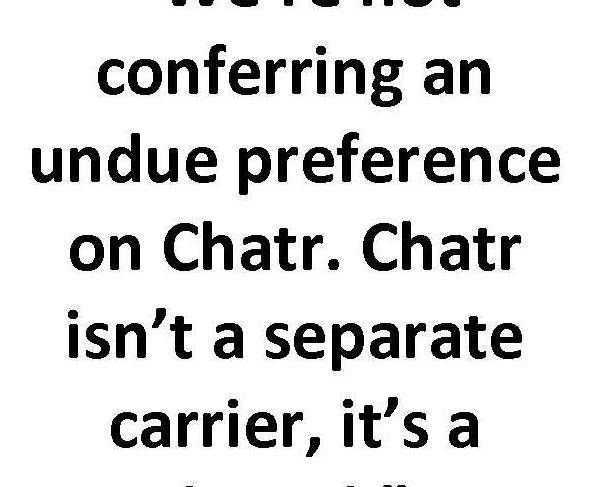
OTTAWA – Wind Mobile has asked the CRTC to step in to try and make sure its customers’ calls aren’t repeatedly fumbled with so-called “hard handoffs” from its roaming provider Rogers Communications.
Wind wants the Commission to toss a flag on Rogers and grant it seamless, or soft, handoffs. A hard handoff, for example, means a Wind customer call is cut off as he moves out of out of a Wind network zone into a Rogers area. A soft handoff would mean the call isn’t dropped as the subscriber moved from network to network while chatting.
In a Part VII filed on October 12, the upstart wireless provider says Rogers is breaking undue preference rules (section 27(2) of the Telecommunications Act) by providing seamless handoff for its discount Chatr brand while not doing the same for Wind.
“Rogers’ conduct subjects Wind to an undue and unreasonable disadvantage by undermining potential Wind customers’ confidence in their ability to access reliable telecommunications of high quality while subscribed to Wind,” states the Wind application.
“Thus, not only does Rogers provide Chatr with seamless call transition when moving out of zone, where it has denied the same to Wind, Rogers, in fact, uses this preference and correlative disadvantage in marketing for its ‘flanker’ or ‘fighting’ brand, Chatr. Rogers relies, as a differentiator, on the proposition that Chatr has ‘fewer dropped calls’. At the same time, Rogers drops its competitor’s calls.”
Not surprisingly, Rogers objects to Wind’s allegations.

“We’re not conferring an undue preference on Chatr. Chatr isn’t a separate carrier, it’s a brand. All of our brands use the Rogers network. We don’t give them seamless handoff, we couldn’t disconnect them. They’re all on the same network,” Ken Engelhart, senior VP of regulatory affairs at Rogers, told Cartt.ca in an interview.
Mobile roaming was most recently dealt with in the run-up to the Advanced Wireless Services (AWS) spectrum auction in 2008. While Industry Canada ordered mandated roaming for new entrants on incumbents’ networks, the department chose not to mandate seamless handoff. Instead, new entrants would have to negotiate seamless handoff with the incumbent wireless carriers.
Engelhart says roaming is a matter better dealt with by Industry Canada, not the CRTC. Calling Wind’s application a “Hail Mary pass”, he says Wind knows roaming falls under the department’s jurisdiction and that the CRTC has no business looking at this.
“The CRTC couldn’t even award roaming. That’s only something that Industry Canada has awarded. So if they couldn’t award roaming, I don’t see how they could change one of the aspects of the roaming,” he says.
Wind CEO Ken Campbell argues that the CRTC is the right place to seek such relief. “There is a good argument that services that should be available for one operator should also be available for others,” he tells Cartt.ca. “And so I think there’s definitely an argument to be made to the CRTC that in the case of Chatr where they are obviously offering seamless roaming, or the perception from consumers is such, versus our scenario where roaming is not seamless – does not allow for a soft handoff – that that is a topic that is very relevant for the CRTC.”
Asked why Wind chose now to file the application with the CRTC, Campbell says the matter became much more important following Roger’s launch of Chatr and the decision to use seamless roaming as a differentiator in its advertising.

“The big thing is obviously spurred on by the situation with Chatr and the fact that it is becoming a point of differentiation in the market,” he says. “And there are cases in the past where operators take advantage of their own position in order to provide a lesser proposition to effectively what they’re wholesaling to us.”
The Wind application highlights several matters when the CRTC ruled that incumbents were subjecting competitors to undue preference and where the commission ordered incumbents to halt those practices.
For Rogers, it’s also a question of price for roaming on its network.
“If they had wanted seamless handoff, we would be charging them a much higher rate for roaming. What they want to do is pay the lower rate and get the seamless handoff and that doesn’t seem very fair. I mean the whole Industry Canada regime is based on negotiating not on applying to the regulator for decisions,” says Engelhart.
Rogers also takes issue with the application because it appears to overstate the impact of hard handoffs.
“They’re talking out of both sides of their mouth because in a complaint they’re making to the Competition Bureau for false advertising, they’re saying dropped calls for roaming out of territory hardly matters at all. It’s statistically insignificant. Yet before the CRTC they’re saying it’s a big deal. So they’re firing all their weapons at once but not in a consistent way,” adds Engelhart.


